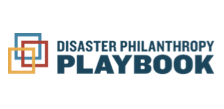... - Chronicle of Philanthropy: Philanthropy’s Stimulus Plan Must Bolster Democracy 4/16 - Nonprofit Quarterly: How ... Is Your Event (if cancelled) Covered by Insurance? CNJG provides this information free to the philanthropic community. If you are not a CNJG member, please join so you can take full advantage of ...
CNJG is tracking philanthropy’s response to the coronavirus ... from the first survey, visit here . Cost : Free for CNJG Members and NonMember Grantmakers This program is only ...
... in the development of the City’s first cultural plan, CreateNYC, in which she coordinated and led hundreds of ... as well collaborating in the writing and production of the plan. She is devoted to civic engagement through culturally ... and the Center for Babaylan Studies. Cost : Free for CNJG Members; $75 for Non Member Grantmakers This program is ...
... policy advocacy and legal assistance. Cost : Free for CNJG Members; $75 for Non Member Grantmakers This program is ... who has assisted Monarch in expanding services to include strategic planning, grant writing, system oversight, project ...
Publication Date: October, 2022
A corporate funder asked our corporate funder listserve about how the corporate foundation is funded either through an endowment or through periodic transfers, or though a share of the profits? This document is a compilation of the responses on the listserve.
Publication Date: November, 2014
Grantmaking at the Crossroads is a workbook designed to provide foundations with a new grantmaking methodology that works at the intersection of place, population, and issue. It offers a pathway to greater inclusion of communities that are often excluded or marginalized by foundation funding and enables foundations to maintain their focus and priorities while expanding their reach and effectiveness.
The Grand Rapids Community Foundation and the Kalamazoo Community Foundation volunteered to be laboratories for Grantmaking at the Crossroads and have been critical informants for this workbook. Each of these foundations holds an unwavering commitment to ongoing learning; this publication would not have happened without their support and engagement and the financial support of the Arcus Foundation.
The Disaster Philanthropy Playbook, a comprehensive resource of best practices and innovative approaches to guide the philanthropic community in responding to future disasters, is now available for use at www.disasterphilanthropy.org/disaster-philanthropy-playbook/.
Designed as a multimedia, interactive website, the Playbook will be an “evergreen” resource designed for continued updates and knowledge-building. Community planning, civic rebuilding, legal services, housing, addressing the needs of vulnerable populations, working with local, state and federal government, mitigation and preparedness are some of the common issues faced by communities post disaster that are covered in detail in the Playbook.
The Disaster Philanthropy Playbook is a joint project of the Center for Disaster Philanthropy and Council of New Jersey Grantmakers in association with the Forum of Regional Associations of Grantmakers.
Publication Date: January, 2016
... to prepare for all phases of a disaster. What can we do to plan and prepare our community? What about mitigation? How do ...
... 8 awards are Incubation Grants, which help organizations plan, research, prototype, experiment or expand existing ... the humanities sector by giving institutions the time and resources for program planning and development. We consider ...
... your philanthropic vehicle with your family’s values, strategic objectives, and desired outcomes, while being ... their philanthropic giving. Cost : This event is free for CNJG Members who are family foundations. Other types of ... are ineligible to join this webinar. This program is a CNJG membership benefit for family foundation members, ...
... organizations. Incubation Grants help organizations plan, research, develop, and prototype public humanities ...
... Equity Task Force, now the Racial Equity Committee of CNJG’s board, the CNJG Board of Trustees approved and adopted the New ... point and journey. In 2025, CNJG will gather tools and resources to help members, other philanthropic organizations, ...
Publication Date: March, 2018
A CNJG member queried our listserves on what online grants ... members use and would recommend for a small foundation. CNJG compiled these responses, and listed the different ...
... nonprofits applied this spring. Through the strategic evaluation and due diligence of our grants ... impact and ensure that our community has access to the resources they need.” Montclair Foundation Awards $75,000 ...
... from the BMS Foundation to address the community and/or strategic capacity-building needs in their areas. The Camden ... and implementation barriers as well as other technical resources. Camden Coalition and the Bristol Myers Squibb ...
... that exemplify our commitment to accessibility, equity and strategic partnerships. As we celebrate 50 years of service, ... that individuals of all ages and backgrounds have the resources they need to thrive. We are especially proud to see ...
... three years of extensive planning through the efforts of CNJG and a number of Council members. CFSJ is dedicated to ... Realizing the need, Council members through the work of CNJG formed The Community Foundation of South Jersey . CNJG is extremely proud to have played a role in building the ...
CNJG is pleased to offer this program to family foundation ... their philanthropic values. Cost : This event is free for CNJG Members who are family foundations. Other types of ... are ineligible to join this webinar. This program is a CNJG membership benefit for family foundation members, ...
ADOPTED: 10/20/2023 APPROACH CNJG takes an active role in championing the vital role New ... long-term, systemic impact, and where the involvement of CNJG could positively shape the outcome of an issue. We ... network building, and leadership. CORE VALUES CNJG values shared power and leadership to advance our ...
... participants to surface priority policy issues, identify strategic opportunities, and explore cross-sector ...

